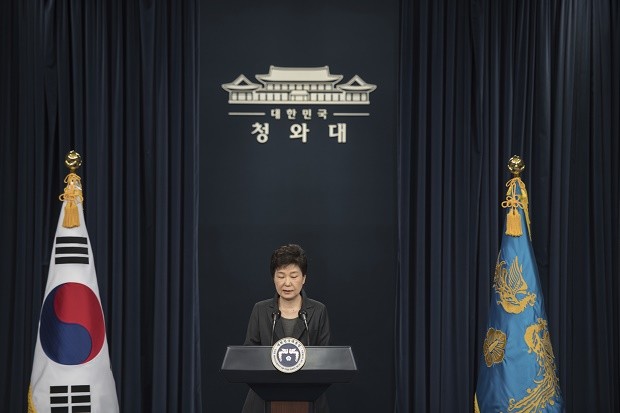
South Korean President Park Geun-hye addresses the nation at the presidential Blue House in Seoul Friday, Nov. 4, 2016. Park took sole blame Friday for a “heartbreaking” scandal that threatens her government and vowed she will accept a direct investigation into her actions amid rising suspicion that she allowed a mysterious confidante to manipulate power from the shadows. AP
SEOUL — She was the secret power behind the South Korean throne, the first allegations said, a mysterious woman whose influence reached deep into the presidential mansion and guided many of the president’s public relations efforts.
She is Choi Soon-sil, the daughter of a cult leader and a longtime friend to President Park Geun-hye. And so far, about the only thing that South Korea knows for sure is that Choi edited some of the president’s speeches.
But as the political furor has grown, the rumors — widely reported here, widely believed and repeated regularly by the political opposition — have grown as well, permeating almost every corner of South Korean society.
By Friday, Choi had been accused of everything from swaying the careers of pop singers to helping craft North Korea policy to influencing Seoul’s multi-billion-dollar purchase of American F-35 fighter jets. With rumors flying, a string of celebrities, from the rapper PSY to a former Miss Korea, have issued statements denying links to Choi’s family or distancing themselves from the scandal.
Such allegations may seem ridiculous, but the gladitorial combat of South Korean politics — and the country’s long traditions of official corruption and influence-peddling — have bred a deep public cynicism. This is a country, after all, where one former president was ordered to repay more than $200 million he had taken in bribes, and another killed himself in 2009 amid a bribery investigation by throwing himself off a cliff.
“We virtually had two presidents handling state affairs,” Choo Miae, a leader of the Minjoo Party, the largest party in the opposition, said last week after allegations began to spill out. “Park Geun-hye was the president during the day, and Choi Soon-sil was the president at night.”
It is unlikely that Choi really had that much power, an octupus with tentacles that steered everything from weaponry purchases to celebrity careers. But there are plenty of signs that she did more than edit a few speeches and handle some public relations issues, as the president has acknowledged.
Choi was formally arrested a few days ago, with prosecutors saying they are investigating accusations that she and a former presidential aide pressured prominent Korean companies to give $70 million to two foundations that she controlled.
In addition, a former senior official of the foundations reportedly told a prominent South Korean newspaper that a presidential aide would regularly give Choi thick stacks of draft government documents on a variety of policy topics. Choi would read the documents with a group of colleagues, then send back assessments for the president.
“We would write a report based on Choi’s orders and we would later receive official Blue House documents that looked exactly like how we wrote them, not a word different,” the official, Lee Seong-han, told the Hankyoreh newspaper.
South Korea’s presidential mansion is commonly known as the Blue House.
With her popularity ratings among the lowest in South Korean history, Park has tried to stabilize the situation by firing eight aides and nominating three new top Cabinet officials, including the prime minister.
But Park’s opponents smell blood. Already weakened by the country’s less-than-stellar economy and her aloof style of governing, they are unlikely to back down anytime soon.
While her opponents are not expected to try to force her to step down — the opposition is not ready yet for elections, and constitutional term limits mean she has less than 18 months left in office — they could leave her badly weakened politically.
On Friday, Park issued a remarkably abject apology in a televised speech, expressing shame over the way her friendship with Choi had spilled into the government.
She also reminded South Korea of the sacrifices she has endured. Her father, dictator Park Chung-hee, was killed by his own spy chief in 1979. Five years earlier, her mother had been killed during an assassination attempt on her father’s life. Single and estranged from her siblings, Park said Friday that the loneliness of power had pushed her to spend more time with Choi.
“Living alone, it was difficult to find people who could help me with the personal things I needed to get done, so I began receiving help from Choi Soon-sil with whom I had a long relationship,” she said.
One speech, though, will not end this kind of turmoil.
Tens of thousands of South Koreans are expected to rally Saturday against the president.
RELATED STORIES